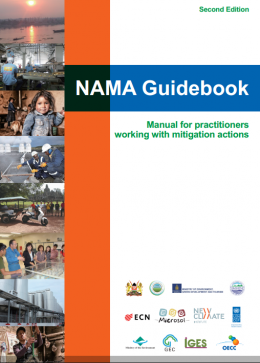NAMA Guidebook: Manual for practitioners working with mitigation action
Year:
2015
Publisher:
OECC
Place:
Japan
Since its creation, nationally appropriate mitigation actions (NAMAs) have increasingly been studied, formulated and implemented, in expectation to realizing the potential to mitigate and reduce GHG emissions, as well as to advancing low carbon and sustainable development in developing countries. Also, initiating and scaling up mitigation actions together with adaptation actions at this stage, is critical for developing countries in the context of the preparation for a future global peak-out of GHG concentration in the atmosphere, combined with developed countries’ further and leading efforts, with a view to facilitate the consideration of intended nationally determined contributions (iNDC), to conform a core of an inclusive global agreement.
The first edition of the NAMA Guidebook was published in February 2014, supported by the Ministry of the Environment, Japan (MOEJ), with contributions by partner countries and research organizations as authors. This guidebook is intended to be a “living document” developed jointly by practitioners both in developing and developed countries, and is open to all those interested in contributing with their own experiences. Thanks to good responses, the first edition was very successful, but we have continued to receive further responses and offers by governments, development partners, researchers, and other practitioners. Bearing in mind that there are willingness to share their useful experiences through this guidebook, another invitation was made in several international events, such as the 20th Conference of the Parties of the United Nations Framework Convention on Climate Change (UNFCCC) in Lima, Peru.
The guidebook has been used and distributed in several international workshops and capacity building activities conducted by the Government of Japan. It has also been distributed as a reference material in UNDP capacity building activities, and the Government of Cambodia is now in the process of translating it into the Khmer language. Sharing experiences and lessons learned is one of the best ways to train people.
The OECC and its partner organizations are working in several programmes related to climate change including the promotion and training of NAMAs. We hope that this publication will serve as a useful tool for practitioners and developing country representatives in their further efforts to move towards low carbon societies.
Reference URL:
Work regions:
Publication Type:
Publication language:
English

Files:
